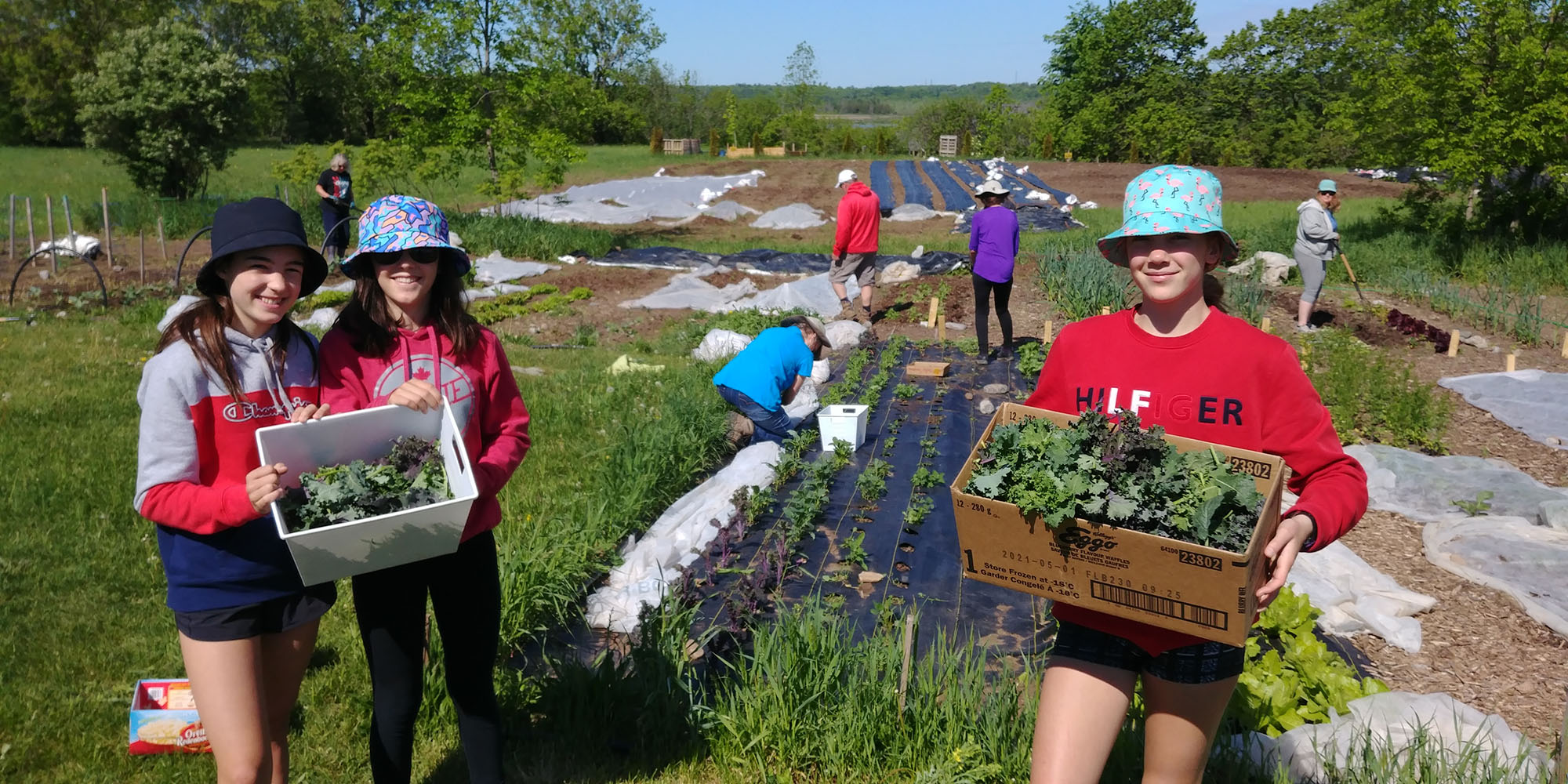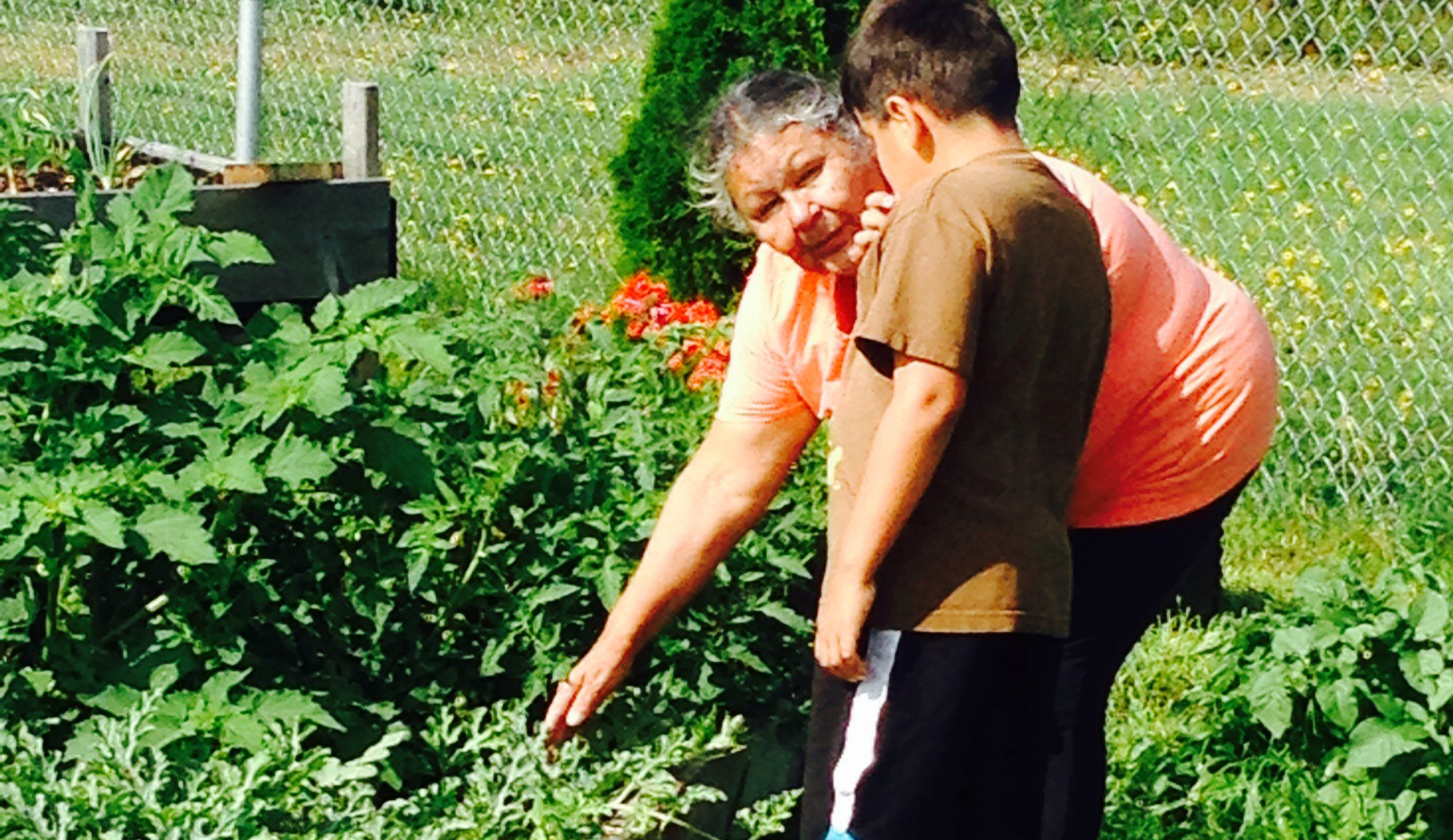Photo: Elsipogtog School, Elsipogtog First Nation, NB
The month of June is National Indigenous History Month, a time to honour the history, heritage and diversity of Indigenous peoples in Canada.
We’d like to start this month by sharing some inspiring stories of school communities who are embracing Indigenous food ways, as well as some resources that you might be able to use to spark discussions and action to support this work.
Stories from the Field:
Through our Farm to School: Canada Digs In! initiative, we have given grants to 17 schools across Alberta, British Columbia, Manitoba, Saskatchewan, Nunavut and Ontario who self-identify as Indigenous or have strong connections to Indigenous communities. Here are a couple of their stories:
 In Masset, British Columbia, Gudangaay Tlaats’gaa Naay Secondary School (GTNS)’s salad bar story shares how their school food culture changed dramatically thanks to a Learning Circle and a supportive principal. The school, located on the north end of Haida Gwaii, moved from “grab and go” hallway meals to home-cooked hot lunches 5 days a week that include local and traditional foods. Students are also preparing soil, planting seeds, weeding gardens, and harvesting food. A science teacher has facilitated a number of land-based field trips, which include deer hunting, fishing, clam digging and harvesting on the land. Back in 2016, GTNS shared with us:
In Masset, British Columbia, Gudangaay Tlaats’gaa Naay Secondary School (GTNS)’s salad bar story shares how their school food culture changed dramatically thanks to a Learning Circle and a supportive principal. The school, located on the north end of Haida Gwaii, moved from “grab and go” hallway meals to home-cooked hot lunches 5 days a week that include local and traditional foods. Students are also preparing soil, planting seeds, weeding gardens, and harvesting food. A science teacher has facilitated a number of land-based field trips, which include deer hunting, fishing, clam digging and harvesting on the land. Back in 2016, GTNS shared with us:
“Over the past 7 years there has been an island wide movement to get more local and traditional foods onto the plates of students. As the hot meals move towards more local seafood, venison roasts, local veggies; students are also leaving the classroom and getting into the garden, getting out to the land to harvest food.” Read more from GTNS here.
The video below showcases the Haida Gwaii Learning Circle and how the community has beautifully come together to reconnect young people to their land and food:
 At Loughborough Public School in Sydenham, Ontario, students are learning how to grow and prepare their own food, and are immersed in projects that bring them closer to the teachings of Anishinaabe and Haudenosaunee culture. A teacher at Loughborough school shares:
At Loughborough Public School in Sydenham, Ontario, students are learning how to grow and prepare their own food, and are immersed in projects that bring them closer to the teachings of Anishinaabe and Haudenosaunee culture. A teacher at Loughborough school shares:
“Experiential education like this means reconnecting with nature through the traditional teachings of Anishinaabe and Haudenosaunee culture which tell us that honouring the land is a way to experience the mental health benefits of gratitude while living sustainably with nature.”
The school has implemented many initiatives that teach sustainability, Indigenous culture and food literacy. Loughborough has been identified as a Legacy School by the Downie Wenjak Foundation for their work towards Truth and Reconciliation. Learn more about Loughborough on our blog here.
To celebrate National Indigenous History Month, we encourage you to find more inspiration on the Indigenous Foodways section of our blog, and explore the resources below.
Resources we can all learn from:
- The First Nations Health Authority in British Columbia has published an informative set of facts sheets on traditional foods, their nutritional value, history of use, and traditional harvesting methods
- The Wild and Country Food In Newfoundland and Labrador Database is designed to help individuals, communities, academics and others better understand the food that’s all around us
 This 28-page Traditional Food Fact Sheet Series, a collaborative effort of Ecology North and the Department of Health and Social Services, also offers tons of information on traditional foods
This 28-page Traditional Food Fact Sheet Series, a collaborative effort of Ecology North and the Department of Health and Social Services, also offers tons of information on traditional foods- The Indigenous Food Circle aims to better understand and promote Indigenous perspectives and experiences around food. Through their UnderstansingOurFoodSystems.com project with the Thunder Bay District Health Unit, they have shared many resources, such as the Thirteen Moon Traditional Harvesting Map, a guide to seasonal cycles and community practices
- Kidsnacks in the US has developed A Traditional Snack Guide Based on Ojibwe Foods that offers some great recipes and discussions
- This Cultivating Change webinar from Food Secure Canada shares the recording of their Lessons from Indigenous-led School Food Programs webinar
- The Earth to Tables Legacies project is a multimedia educational package focused on Indigenous-settler relations, food justice, food sovereignty and anti-racism in the food movement. The website offers a plethora of resources including videos and facilitator’s guides supplemented by insightful commentary from activists & academics across Turtle Island. Read more about Earth to Tables on our blog here.
- Red Rising Education out of Winnipeg supports educators to integrate Indigenous pedagogy and ways of knowing into their learning spaces. Check out their “What is Indigenous Education?” video and other resources.
- And the Indigenous Communities tab of our resource centre shares other local food to school resources and initiatives; for instance, the BC Farm to School Guide speaks about incorporating traditional foods into school menus
If you have a resource in mind that you’d like to share, please let us know at info@farmtocafeteriacanada.ca!
We are proud of what F2CC has accomplished so far; however, we know that much more must be done so that we can better honour Indigenous peoples, histories and lands on which we all live today.
As part of our continued work, F2CC hosted a series of virtual sharing circles earlier this year to co-create a roadmap to help guide our commitment to supporting Indigenous school communities through concrete and enduring actions. Thank you to all those who participated in these circles! We are excited to report back on them later this month.






[…] like to share Farm to Cafeteria Canada (F2CC)’s recent blog post that highlights some inspiring stories of school communities who are embracing Indigenous foodways, […]